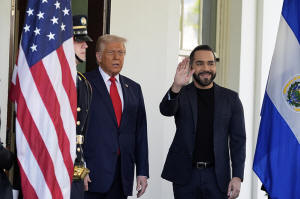El Salvador president announces 'foreign agents' proposal, fueling
concerns of crackdown on dissent
[May 15, 2025]
By MEGAN JANETSKY and MARCOS ALEMÁN
SAN SALVADOR, El Salvador (AP) — El Salvador President Nayib Bukele said
he's pushing forward a “foreign agents” bill that critics say would deal
another blow to civil society and independent journalistic organizations
as the popular president tightens his control three years into a
crackdown against gangs.
While Bukele announced few details of the proposal Tuesday night, the
president wrote on X that the bill would include a 30% tax on donations
to non-governmental organizations, some of which have long criticized
his government for moves they assert are undemocratic. Because Bukele’s
party has a firm grip on control of the country’s congress, he will
likely face few hurdles in jamming the legislation through.
It resembles a similar proposal championed by Bukele in 2021, which
collapsed under the weight of international criticism. But critics say
the Salvadoran leader – adored by American right-wing figures – has
become emboldened by his recent political alliance with U.S. President
Donald Trump.
Juan Pappier, Americas director for Human Rights Watch, warned that it
falls in line with measures passed by autocratic governments to crack
down on dissent, citing laws in Nicaragua, Venezuela, Russia, Belarus
and China.
“Passing foreign actors legislation is a classic move in the autocrats’
playbook. There’s nothing creative or innovative about this,” Pappier
said. “This is a way of stigmatizing organizations that receive foreign
funding and of limiting their work.”

In nearby Nicaragua, the government in an all-out crackdown on dissent
has used such laws to shut down or outlaw at least 3,500 NGOs since mass
social protests erupted in 2018. Among them were a scouting association
and a rotary club.
Bukele’s proposal comes after hundreds of people peacefully protesting
an eviction order in front of Bukele’s house were met with a violent
response by police, which detained at least two people. The leader
quickly cast blame on civil society groups and announced the measure on
his social media.
“Yesterday we witnessed how humble people were manipulated by
self-proclaimed leftist groups and globalist NGOs, whose only real goal
is to attack the government,” he wrote.
Bukele has cited such funds as evidence of the groups' corruption and
bias against him, but it is fairly common in poorer countries in Latin
America to depend on international aid dollars, as it's often difficult
to raise money in their own countries.

[to top of second column]
|

President Donald Trump receives El Salvador's President Nayib Bukele
at the West Wing of the White House, in Washington, April 14, 2025.
(AP Photo/Alex Brandon, File)

Bukele's 2021 proposal would have required groups that receive monetary
support from abroad to register as “foreign agents,” something that
would severely limit their activities. The measure failed in Congress
that year after the Biden administration and the European Union raised
concerns, and the German embassy threatened to withdraw funding for
humanitarian programs in the country.
Since, Bukele has further consolidated power in all branches of
government, and simultaneously feels “emboldened” by his alliance with
Trump to stamp out dissent, said Pappier.
Bukele has long been at odds with human rights groups as they have
criticized his harsh crackdown on the country’s gangs, in which he has
suspended key constitutional rights and arrested more than 85,000 for
alleged gang ties. He has repeatedly accused human rights organizations
of defending gangsters.
Security has improved dramatically, and Bukele easily won reelection
last year despite a constitutional prohibition on serving consecutive
terms.
Human rights groups are again criticizing Bukele's administration after
the Trump administration sent more than 200 Venezuelans to a maximum
security prison in El Salvador, despite little to no evidence that they
belonged to a gang as the Trump administration alleged.
The measure builds off a number of moves by the government in recent
weeks that have raised alarm by watchdog groups.
“El Salvador is entering that group of countries that repress civil
society in order to stay in power and that there is no criticism, no
questioning, no social scrutiny of the exercise of power,” said Ingrid
Escobar, lawyer and head of the rights group Socorro Juridico.
Earlier in the month, Bukele ordered the arrest of five heads of bus
companies after they defied his order to offer free transport for a week
following a major highway closure.
That same week, the investigative news organization El Faro said it
received word that the government was preparing arrest warrants for
reporters after the organization published a series of stories about
Bukele’s alleged ties to gangs. No arrests have been made.
——
Janetsky reported from Mexico City.
All contents © copyright 2025 Associated Press. All rights reserved |